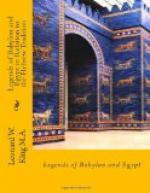This grouping of Sumerian and Hebrew authorities, against the extant sources from Babylon, is emphasized by the general framework of the Sumerian story. For the literary connexion which we have in Genesis between the Creation and the Deluge narratives has hitherto found no parallel in the cuneiform texts. In Babylon and Assyria the myth of Creation and the Deluge legend have been divorced. From the one a complete epic has been evolved in accordance with the tenets of Babylonian theology, the Creation myth being combined in the process with other myths of a somewhat analogous character. The Deluge legend has survived as an isolated story in more than one setting, the principal Semitic Version being recounted to the national hero Gilgamesh, towards the close of the composite epic of his adventures which grew up around the nucleus of his name. It is one of the chief surprises of the newly discovered Sumerian Version that the Hebrew connexion of the narratives is seen to be on the lines of very primitive tradition. Noah’s reputation for piety does not stand alone. His line of descent from Adam, and the thread of narrative connecting the creation of the world with its partial destruction by the Deluge, already appear in Sumerian form at a time when the city of Babylon itself had not secured its later power. How then are we to account for this correspondence of Sumerian and Hebrew traditions, on points completely wanting in our intermediate authorities, from which, however, other evidence suggests that the Hebrew narratives were derived?
At the risk of anticipating some of the conclusions to be drawn in the next lecture, it may be well to define an answer now. It is possible that those who still accept the traditional authorship of the Pentateuch may be inclined to see in this correspondence of Hebrew and Sumerian ideas a confirmation of their own hypothesis. But it should be pointed out at once that this is not an inevitable deduction from the evidence. Indeed, it is directly contradicted by the rest of the evidence we have summarized, while it would leave completely unexplained some significant features of the problem. It is true that certain important details of the Sumerian tradition, while not affecting Babylon and Assyria, have left their stamp upon the Hebrew narratives; but that is not an exhaustive statement of the case. For we have also seen that a more complete survival of Sumerian tradition has taken place in the history of Berossus. There we traced the same general framework of the narratives, with a far closer correspondence in detail. The kingly rank of Ziusudu is in complete harmony with the Berossian conception of a series of supreme Antediluvian rulers, and the names of two of the Antediluvian cites are among those of their newly recovered Sumerian prototypes. There can thus be no suggestion that the Greek reproductions of the Sumerian tradition were in their turn due to Hebrew influence. On the contrary we have in them a parallel case of survival in a far more complete form.




